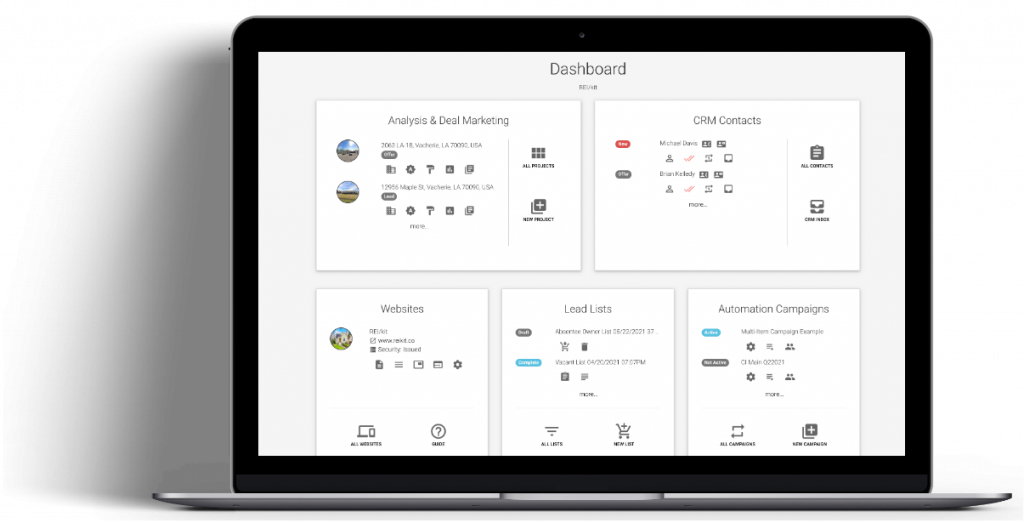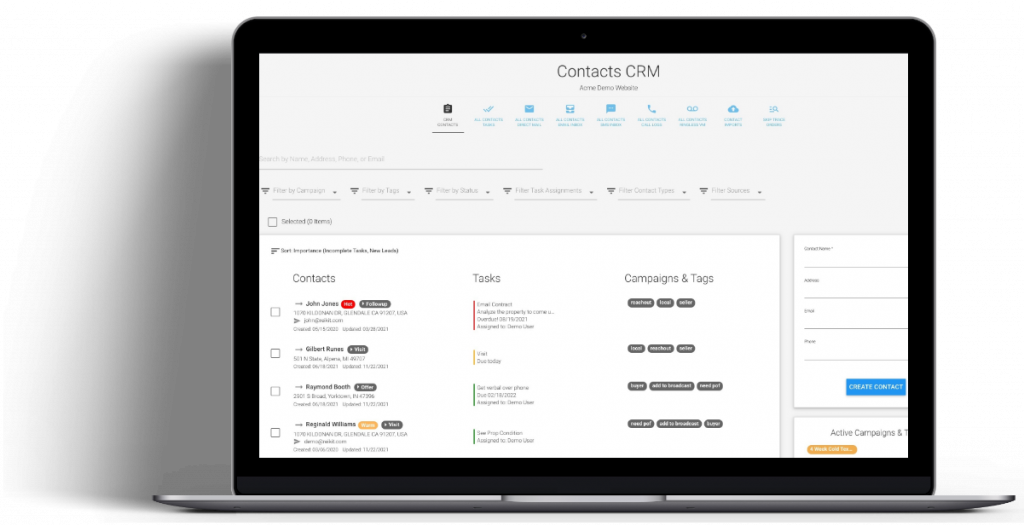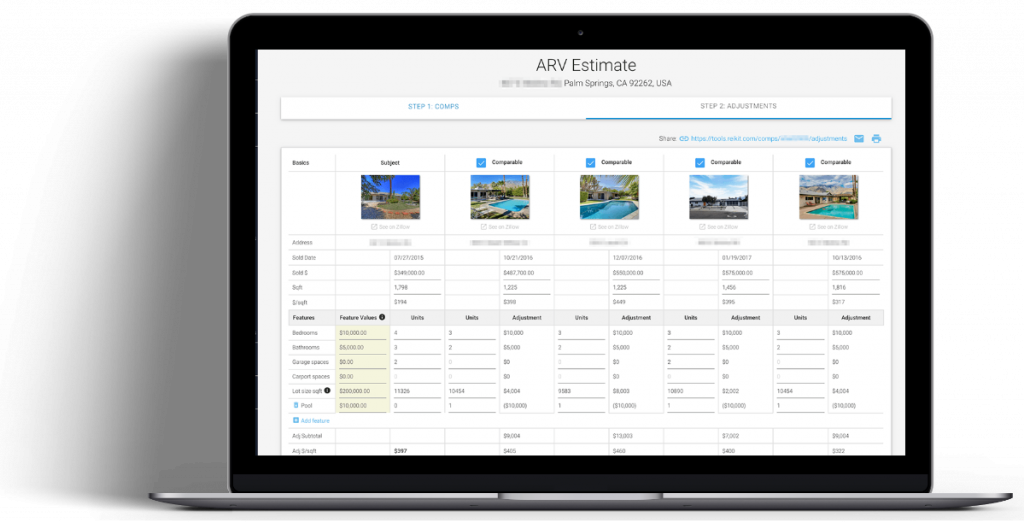
In this post I list 8 ways that you can use to find and vet contractors for your house flipping business, and go into detail on what to look for when vetting an investor-friendly contractor.
Based on the number of local home improvement booklets that I get in my mailbox every week, there’s no shortage of companies that specialize in remodeling. So how do you pick who to work with?
While you may be tempted to pick up the phone and start calling these advertisements, residential retail contractors are typically not your best bet when it comes to rehabbing an investment property. Instead, you should look for an investor-friendly contractor who specializes in whole-house rehabs.
Below are the 8 best ways to find investor-friendly contractors, and none of them involve advertisements that you get in your mail.
Whichever method you use to find contractors, the very first thing you’ll want to ask is if they work with real estate investors. This telling question will quickly reduce the number of contractors that you meet with, to only the ones that understand your needs as an investor.
Let’s start with online resources.
Places to find or vet contractors online:
Angie’s List
The inclusion of Angie’s List may be surprising if you are familiar with the site. It is one of the most well-known websites for finding contractors, and it’s pretty much the online equivalent of a glossy mailer, meaning high-priced retail work.
It’s almost exclusively advertising aimed at retail customers on smaller projects or home improvement gigs that charge high premiums.
So why include them?
First of all, most contractors that have been in business for any amount of time will eventually be listed on the site. So although most of the contractors that you will find there are looking for retail customers, some of them also do investor work.
In fact, the best contractor that I have personally found, I found them on Angie’s list.
So while most of the contractors from that site won’t call you back, for the ones that do, the beauty about Angie’s List is that you can see feedback that they got for their previous work, rated by their area of expertise and the specific job that was completed.
Pros:
- Your next contractor is probably listed there
- Useful feedback/rating mechanism
- You can specialize your searches
- Expertise may benefit new investors
Cons:
- Most contractors there are expecting high premiums for most work
- You will need to call many contractors before you find one that works with investors
Craigslist to find a contractor
On the opposite end of the spectrum, we have advertising behemoth Craigslist.
Craigslist is the wild west to Angie’s List’s organized platform. While you can search for the perfect contractor for your needs by using particular keywords, there is zero vetting involved on the site itself.
There are two benefits to using Craigslist.
The first, if you are not crunched for time, is to post ads yourself advertising the need for workers, and let the contractors seek you out.
The other is to get bids from contractors that you find and use those bids as a comparison to the companies you find using other methods. The competition is extremely fierce on Craigslist, with contractors often offering rock-bottom prices to beat out other advertisers.
This may help you identify where a high-premium contractor is padding their materials or labor if the estimates are wildly different.
You will absolutely need to interview and vet the contractors that you find, or that respond to your ads.
Pros:
- Can personalize an ad for your properties
- Can search for contractors easily
Cons:
- Need to thoroughly interview ad responders
- Can’t see immediate feedback for work
Yelp as a vetting resource
Yelp is a review site most useful for retail brick-and-mortar establishments, so reviews for small or single person contracting companies may be sparse.
However, it works well to cross-reference a contractor you have already found for their Yelp reviews and positive or negative feedback. You’ll also be able to see what types of work they typically agree to, and by reading the reviews carefully you can determine what kinds of jobs they are usually reviewed for.
Another downside to Yelp is that it’s that some companies and organizations fudge their reviews to make them better than they actually are. This takes a little experience to weed out the fake reviews, and you should be careful regardless since it’s easy enough to fake positive reviews as well.
Overall, as mentioned, Yelp is best used in conjunction with other techniques, rather than your sole resource for determining a good contractor.
Pros:
- Easy way to see feedback or general reputation
Cons:
- Hard to search specifically for investor-friendly
- Reviews may be easily faked
NextDoor for recommendations and vetting
If the property you are fix and flipping is located near you, you can sign up for a NextDoor account.
NextDoor was built to help entire neighborhoods band together to watch out for their community, but it has expanded to include local reviews. You will often find people asking for recommendations, and contractors will advertise their services as well.
If you find many people recommending the same contractor, then you can use that as a good signal.
One downside of using NextDoor is that because it relies on sporadic input exclusively from a specific area, the reviews may be older. It’s still worth a look, especially the “Best of” awards that are handed out yearly.
Pros:
- Feedback is hyper-local
Cons:
- Reviews are not always recent
Next, you may like a more hands-on approach, so I list some great ways to find contractors in person.
Ways to find contractors in person:
Check local construction rehabs
This is my absolutely favorite way to find contractors.
Sometimes, hitting the pavement to check out current rehabs going on across your local area is the best way to find contractors for your own projects.
By investigating the rehabs in person, you can view the contractor’s actual work and results. Look for tell-tale signs of a flip in progress: an empty house with work going on throughout; it’s highly likely that an investor-friendly remodeling company is on site.
If he or she is available, you can exchange information with the GC on the spot and even ask for a tour if it looks like the finishings are similar to what your flip will require. Keep an eye out for obviously shoddy workmanship such as bad paint jobs, uneven tiling, mis-matched flooring, and so on.
Pros:
- Allows you to almost immediately get in touch with a contractor
- Can see results of work firsthand
Cons:
- You might have to visit the property a couple times before you find the GC on-site
Home Depot
Home Depot, Lowe’s, and other big-box hardware stores are buzzing with contractors that are often sporting their company t-shirt.
One trick is to rise early and get to the store right when it opens to chat up the contractors that are getting their supplies before they’re supposed to be at their worksite. While it doesn’t take the place of careful vetting, it does at least display professionalism.
It’s generally also a good time to talk to them away from the chaos of a job site and find out what types of jobs they do.
Pros:
- Easy method to talk to contractors in person
Cons:
- You may have to talk to quite a few people before finding an investor-friendly General Contractor
Ask Investors and Contractors for Referrals
Although you might think that other investors won’t share their contractor’s name to keep the best contractors for themselves, I have found the investment community to be quite generous, so you shouldn’t be afraid to ask for a recommendation.
If their crew is busy, they might recommend someone else for the job.
Pros:
- Uses real-life experience from fellow investors and contractors
Cons:
- Investors may withhold the best contractors from you to look out for their own business
- Contractors may recommend people they have relationships with, not the right one for the job
Ask Suppliers
Suppliers for bulk materials such as tile, flooring, and cabinets are another good way to start learning the names of reliable contractors that may continually work on flips.
While this isn’t a surefire method, it does take advantage of the experience that most suppliers likely have when dealing with contractors, so their expertise can be to your benefit, particularly if you’re just starting out in this business.
Keep in mind the supplier may have a relationship with a particular contractor, so always vet any recommendations thoroughly.
Pros:
- Suppliers likely know of many investor-friendly contractors
Cons:
- They might have a conflict of interest
Now that I’ve covered the ways to find investor-friendly contractors, let’s get into the vetting process.
Vetting investor-friendly contractors
We’ve all heard the horror stories of terrible contractors, and you may think this is just par for the course in the industry. However, as property flippers your business depends on your ability to manage this risk. Understanding the most important traits to look for in a contractor will help you with the vetting process.
Although when I first started out my vetting spreadsheet had over 50 questions that I used to tailor my initial calls and emails with contractors, experience has shown that initially you really only need to know 2 things before you engage with a new contractor.
The first is whether they provide itemized bids, and the second is how well they communicate with you.
Do they provide itemized bids?
Most retail contractors hate providing itemized bids, because it shows in plain sight the shenanigans they’re trying to pull and will flatly refuse to provide them. That is good for you; let them self-select out.
When you have a tight budget, you need to be able to account for every penny. There’s nothing as frustrating as receiving a receipt for materials from your GC that simply states, “HD, $400.” (true story — presumably that stands for Home Depot, your guess is as good as mine).
To avoid that and make sure your contractors are giving you what you have paid for, you will need to request project bids that are itemized in detail.
Pro Tip: Don’t get ripped off
To be able to gauge whether a contractor is padding their estimates, and on what items, you have to understand how much the repairs and materials they are bidding on cost, including the labor cost to install them.
You can use the Rehab Cost Estimator tool in REI/kit to create a detailed rehab estimate based on their itemized list. The tool will calculate the material and labor cost for each item you select, localized to the property’s zip code.
Compare this to all of the bids you receive, and each bid to the other, to see where the bid is too high or too low.
That brings me to my next point regarding the vetting process: getting your point across.
Communication
Communication is one of the most frequent complaints of working with contractors, and therefore one the most important expectations to establish for a successful investor contractor relationship.
In general you will want to understand from your contractor how long you expect that they will have to get back to you, how often they will provide you the status of the job, and in what format, and how they will communicate with you any issues or change requests.
Consistent communication is the key to a smooth rehab, ensuring no surprises and the ability to pivot quickly when issues do arise.
Important additional research to do in the vetting process
Once you have a short list of contractors that you have been in contact with and have received bids from and feel like you would like to work with, it’s important to perform additional research on their business.
In many cases this research can often be done online in your state or jurisdiction:
- Is their business active and in good standing with the state Secretary of State’s office
- Have they ever been sued, or involved in a lawsuit
- Check the Better Business Bureau (BBB) for their rating and any complaints made against the company
Summary
Finding a great investor-friendly contractor requires time and persistence, but the tips in this post will help streamline your search. With eight new ways to find property rehabbers, the two major traits to look for, and qualifying questions to ask of a potential contractor, you’ll soon have your dream team of contractors lined up and ready to get started.
Any other ways to find great contractors that I missed? Let me know in the comments below.



